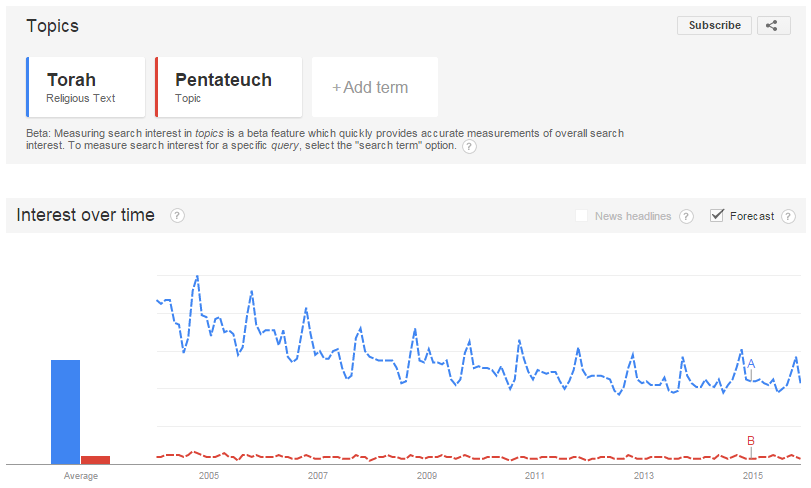Idea #15: Searching, Reading, and Studying the Torah and Pentateuch
The first five books of the Bible in the Old Testament portion is known as Pentateuch in Christianity) and the Torah (in the Jewish faith). These sacred books presents an amazing set of faith narratives about the origins of all creation and humanity, the flood narratives, the calling of Abraham, the covenant relationship between G-d and His chosen people, the giving of the laws, the drama of the exodus, the lineage of the first generations, and many other epic tales.
Worldwide interest in these texts has spanned many centuries of human history, and even into the digital age of the 21st century. This chart below shows the Google search trends over time for the keywords “Torah” and “Pentateuch” —
Interesting to see the interest in the Torah far exceeds the Pentateuch, though the Christian population outnumbers the Jewish population. (Wonder what’s going on there?)
Scholars and theologians have differing conclusions about the authorship of the Pentateuch, and that typically is a reflection of their theological perspectives. Traditionally, the Torah’s authorship is attributed to Moses, as the text of the Torah has been preserved over many centuries and generations. However, scholars that use a higher criticism method have attributed authorship to hypothetical authors, each denoted with an initial: J, E, D, and P; see these articles for explanations:
- The Documentary Hypothesis of the Pentateuch also known as the JEDP Theory by Matt Slick (@ carm.org) - “higher criticism is… scholarly attempts to disprove its authenticity and reliability”
- Who wrote the Pentateuch, a.k.a. the Five Books of Moses? (@ Ontario Consultants on Religious Tolerance) - clearly presents the contrasting views of conservative and liberal theologians
- Does It Really Matter Who Wrote the Pentateuch? by Eric Lyons, M.Min. (apologeticspress.org)
Let’s not miss the main thing. What does the Pentateuch have to say for itself? What remains unquestionably important and significant is the content of the Pentateuch and Torah. Notice how this excerpt from a non-faith source recognizes the importance of these five books, from “Introduction to the Pentateuch- The First Five Books of the Bible” by Austin Cline, Agnosticism/Atheism Expert (about.com):
“The Bible begins with the Pentateuch. The five books of the Pentateuch are the first five books of the Christian Old Testament and the entire Jewish written Torah. These texts introduce most if not all of the most important themes that will recur throughout the Bible as well as characters and stories that continue to be relevant. Thus understanding the Bible requires understanding the Pentateuch.”
A list of the 5 best articles about the Pentateuch I could find:
- Introduction to the Pentateuch: A brief overview of the first five books of the Bible by Sam O’Neal, about.com Bible guide
- What Is the Torah? All About the Torah, Judaism’s Most Important Text by Ariela Pelaia, about.com Jewish guide
- What is the Pentateuch? (@ gotquestions.org) - explaining how the 5 books fit together
- entry for Pentateuch in The Catholic Encyclopedia
- entry for The Pentateuch in the New American Bible Revised Edition (published by US Conference of Catholic Bishops)
The Jewish devotion to the Torah is quite fervent; as described in this excerpt from Torah: The Tree of Life - What is the Torah and Why Do We Study It? (reformjudaism.org):
“For the Jewish people, the study of Torah never ends. Each year, as we read the sacred text again, it can be as if we are reading it for the first time. Each encounter with sacred text offers the possibility of new meanings. The Reform movement has published a number of editions of the Torah, with contemporary commentary.”
- Judaism: The Written Law - Torah (JewishVirtualLibrary.org)
- torahanytime.com (Torah Anytime) has 20,000+ Torah videos of Torah lectures by 400+ different Jewish speakers and Rabbis
- Torah.com is an online portal dedicated to sharing the wisdom of Torah
With this much interest in the “Torah” and “Pentateuch” (as indicative of the search volume), what if there was a definitive website that clearly presents all the available research and studies of these books of the Bible? Here’s one idea of what that could look like: a mashup of Google News and the articles about the Pentateuch. Wouldn’t that be great?
—-
This article is part of the blog series, 66 Ideas for .BIBLE Domain Names, with practical ideas for using .BIBLE domain names. Individuals and organizations can now register .BIBLE domain names that are more shareable, memorable, and meaningful at any accredited registrar.


